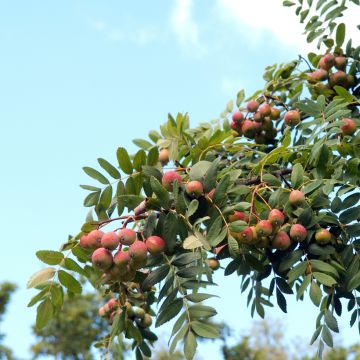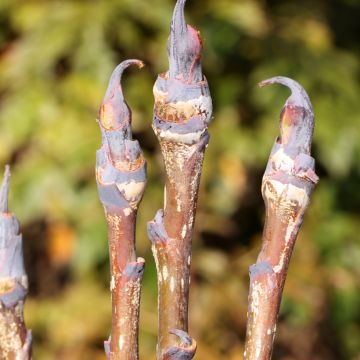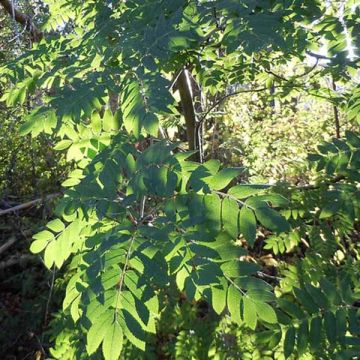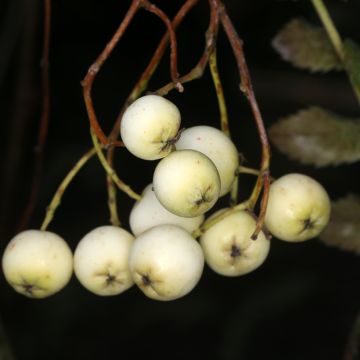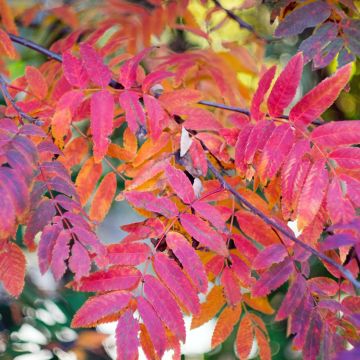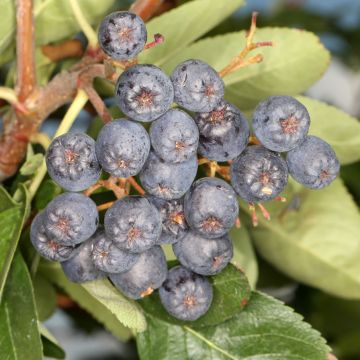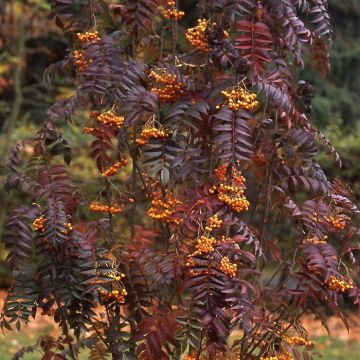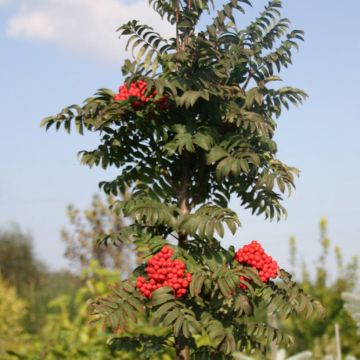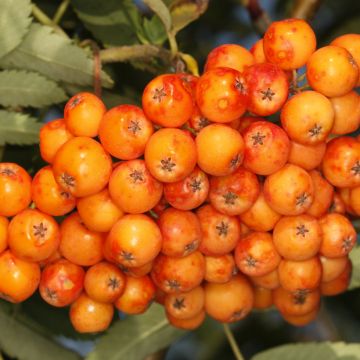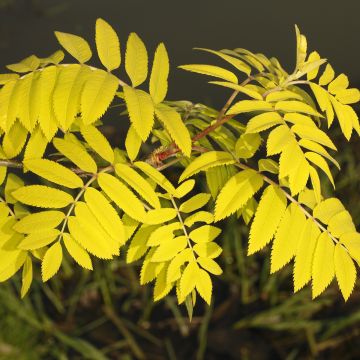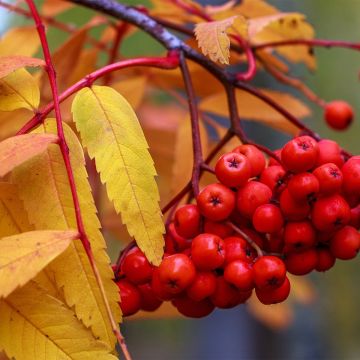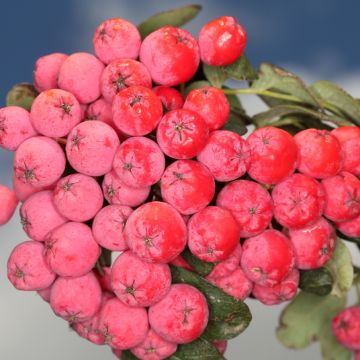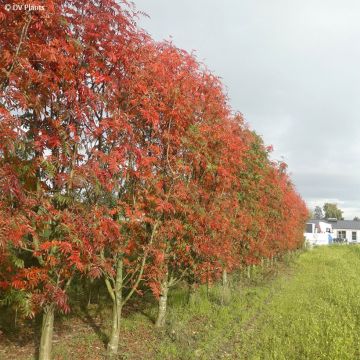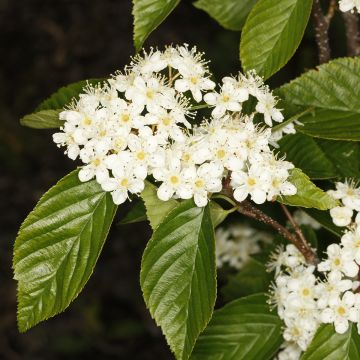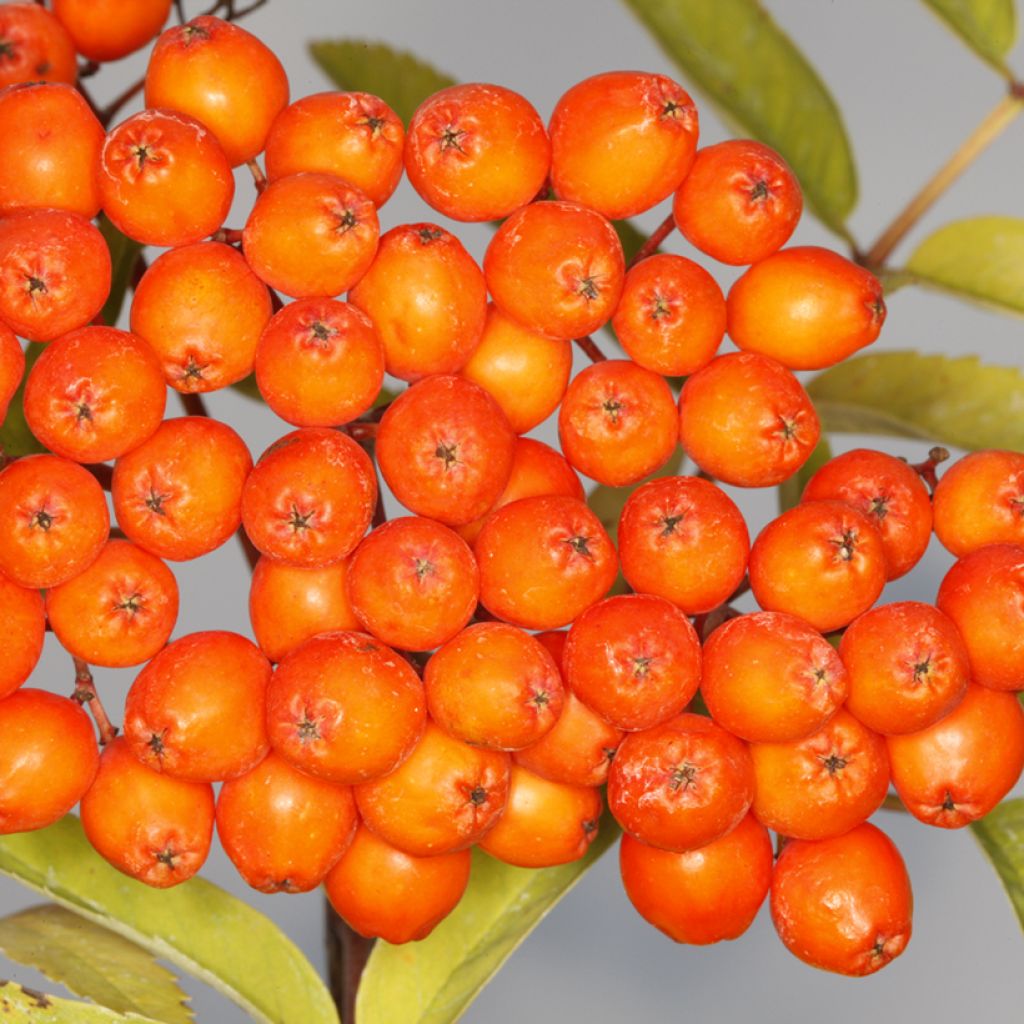

Sorbus aucuparia Konzentra - Rowan
Sorbus aucuparia Konzentra - Rowan
Sorbus aucuparia Konzentra
Rowan, Mountain Ash
Special offer!
Receive a €20 voucher for any order over €90 (excluding delivery costs, credit notes, and plastic-free options)!
1- Add your favorite plants to your cart.
2- Once you have reached €90, confirm your order (you can even choose the delivery date!).
3- As soon as your order is shipped, you will receive an email containing your voucher code, valid for 3 months (90 days).
Your voucher is unique and can only be used once, for any order with a minimum value of €20, excluding delivery costs.
Can be combined with other current offers, non-divisible and non-refundable.
Why not try an alternative variety in stock?
View all →This plant carries a 24 months recovery warranty
More information
We guarantee the quality of our plants for a full growing cycle, and will replace at our expense any plant that fails to recover under normal climatic and planting conditions.
Would this plant suit my garden?
Set up your Plantfit profile →
Description
Sorbus aucuparia 'Konzentra' is a variety of rowan selected for its abundant and edible fruiting. It is a deciduous tree appreciated for its honey-producing white spring flowering, autumn colours, and beautiful clusters of red fruit, rich in vitamin C. These can be enjoyed fresh or prepared as jelly or jams. it is very hardy and accommodating regarding soil and climate.
The rowan is a tree reaching about fifteen metres that naturally grows in hedges, along paths, or at the edge of woods. Its natural distribution area is immense, covering a large part of Europe, Russia, temperate Asia, and extending as far as Japan. Its great hardiness and tolerance to many different natural conditions, whether in terms of soil or climate, explain this species' capacity for expansion. In the countryside, its berries serve as a pantry for wild birds. It is a member of the large family of Rosaceae.
Sorbus aucuparia 'Konzentra' is a horticultural variety, selected for its ornamental and fruiting qualities. The tree is characterised by an upright and flexible habit. Its growth is rapid, ranging from 20 to 40 cm per year. Eventually, it will reach between 9 and 12 m in height with a width of 4 to 6 m. The white flowers appear in May and June, arranged in large flattened panicles, attracting numerous pollinators such as bees and bumblebees. At the end of summer, the flowers transform into orange-red berries, ready to be harvested from late August to early October. The small to medium fruits contain moderately firm pulp with a tart flavour. They are particularly rich in vitamin C. The leaves of the rowan 'Konzentra' are pinnate and measure up to 15 centimetres long, dark green on top and grey-green underneath. In autumn, they take on various shades of yellow, orange, and red before falling. The bark is smooth and grey, becoming rougher with age. This very hardy tree withstands temperatures down to -34°C.
Rowan 'Konzentra' is suitable for medium-sized gardens and large grounds. It can be used as an isolated specimen or in a thicket or large informal hedge. It can be associated with Cornus alba (white dogwood), which has beautiful red stems in winter, Betula pendula 'Royal Frost' (verrucate birch) notable for its white bark, purple foliage, and elegant habit, Viburnum opulus (guelder rose) for its white flowers and red berries, and Acer campestre 'Carnival' (field maple) for its beautiful variegated foliage.
In summary, Sorbus aucuparia 'Konzentra' is an excellent choice for any gardener looking to add a touch of colour and biodiversity to their green space, while also benefiting from the robustness and nutritional qualities of its fruits.
Report an error about the product description
Plant habit
Flowering
Foliage
Botanical data
Sorbus
aucuparia
Konzentra
Rosaceae
Rowan, Mountain Ash
Cultivar or hybrid
Other Sorbus - Mountain Ash
View all →Planting and care
Sorbus aucuparia 'Konzentra' is best planted in autumn in any soil, preferably moist, slightly acidic to neutral (it also tolerates chalky soil). It is low-maintenance and adapts to loamy, clayey or sandy soils. Dig a planting hole measuring 60 to 80 cm on each side and add a bit of compost to the bottom if the soil is poor. Soak the container in a bucket to thoroughly moisten the root ball before placing it in the planting hole. Backfill and water generously; monitor the watering during the first two years to help the young plant establish well.
It thrives in dappled shade or in non-scorching sun in the northernmost regions, and has no particular requirements. It is a pioneer species capable of establishing itself in poor soils.
Planting period
Intended location
Care
This item has not been reviewed yet - be the first to leave a review about it.
Haven't found what you were looking for?
Hardiness is the lowest winter temperature a plant can endure without suffering serious damage or even dying. However, hardiness is affected by location (a sheltered area, such as a patio), protection (winter cover) and soil type (hardiness is improved by well-drained soil).

Photo Sharing Terms & Conditions
In order to encourage gardeners to interact and share their experiences, Promesse de fleurs offers various media enabling content to be uploaded onto its Site - in particular via the ‘Photo sharing’ module.
The User agrees to refrain from:
- Posting any content that is illegal, prejudicial, insulting, racist, inciteful to hatred, revisionist, contrary to public decency, that infringes on privacy or on the privacy rights of third parties, in particular the publicity rights of persons and goods, intellectual property rights, or the right to privacy.
- Submitting content on behalf of a third party;
- Impersonate the identity of a third party and/or publish any personal information about a third party;
In general, the User undertakes to refrain from any unethical behaviour.
All Content (in particular text, comments, files, images, photos, videos, creative works, etc.), which may be subject to property or intellectual property rights, image or other private rights, shall remain the property of the User, subject to the limited rights granted by the terms of the licence granted by Promesse de fleurs as stated below. Users are at liberty to publish or not to publish such Content on the Site, notably via the ‘Photo Sharing’ facility, and accept that this Content shall be made public and freely accessible, notably on the Internet.
Users further acknowledge, undertake to have ,and guarantee that they hold all necessary rights and permissions to publish such material on the Site, in particular with regard to the legislation in force pertaining to any privacy, property, intellectual property, image, or contractual rights, or rights of any other nature. By publishing such Content on the Site, Users acknowledge accepting full liability as publishers of the Content within the meaning of the law, and grant Promesse de fleurs, free of charge, an inclusive, worldwide licence for the said Content for the entire duration of its publication, including all reproduction, representation, up/downloading, displaying, performing, transmission, and storage rights.
Users also grant permission for their name to be linked to the Content and accept that this link may not always be made available.
By engaging in posting material, Users consent to their Content becoming automatically accessible on the Internet, in particular on other sites and/or blogs and/or web pages of the Promesse de fleurs site, including in particular social pages and the Promesse de fleurs catalogue.
Users may secure the removal of entrusted content free of charge by issuing a simple request via our contact form.
The flowering period indicated on our website applies to countries and regions located in USDA zone 8 (France, the United Kingdom, Ireland, the Netherlands, etc.)
It will vary according to where you live:
- In zones 9 to 10 (Italy, Spain, Greece, etc.), flowering will occur about 2 to 4 weeks earlier.
- In zones 6 to 7 (Germany, Poland, Slovenia, and lower mountainous regions), flowering will be delayed by 2 to 3 weeks.
- In zone 5 (Central Europe, Scandinavia), blooming will be delayed by 3 to 5 weeks.
In temperate climates, pruning of spring-flowering shrubs (forsythia, spireas, etc.) should be done just after flowering.
Pruning of summer-flowering shrubs (Indian Lilac, Perovskia, etc.) can be done in winter or spring.
In cold regions as well as with frost-sensitive plants, avoid pruning too early when severe frosts may still occur.
The planting period indicated on our website applies to countries and regions located in USDA zone 8 (France, United Kingdom, Ireland, Netherlands).
It will vary according to where you live:
- In Mediterranean zones (Marseille, Madrid, Milan, etc.), autumn and winter are the best planting periods.
- In continental zones (Strasbourg, Munich, Vienna, etc.), delay planting by 2 to 3 weeks in spring and bring it forward by 2 to 4 weeks in autumn.
- In mountainous regions (the Alps, Pyrenees, Carpathians, etc.), it is best to plant in late spring (May-June) or late summer (August-September).
The harvesting period indicated on our website applies to countries and regions in USDA zone 8 (France, England, Ireland, the Netherlands).
In colder areas (Scandinavia, Poland, Austria...) fruit and vegetable harvests are likely to be delayed by 3-4 weeks.
In warmer areas (Italy, Spain, Greece, etc.), harvesting will probably take place earlier, depending on weather conditions.
The sowing periods indicated on our website apply to countries and regions within USDA Zone 8 (France, UK, Ireland, Netherlands).
In colder areas (Scandinavia, Poland, Austria...), delay any outdoor sowing by 3-4 weeks, or sow under glass.
In warmer climes (Italy, Spain, Greece, etc.), bring outdoor sowing forward by a few weeks.






























